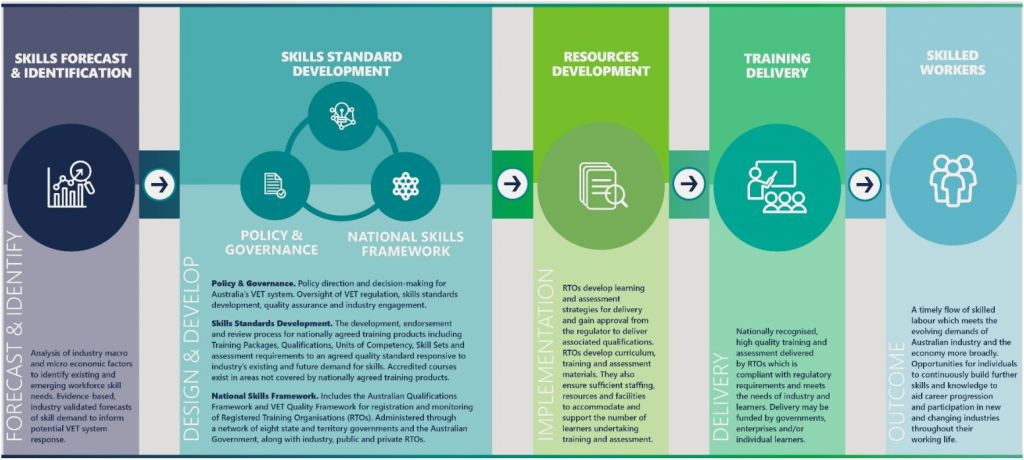Industry Leadership
The VET sector is intrinsically linked to jobs and to productivity. It supports Australian industry to be globally competitive. Industry leadership of the VET sector is important.
Under the current system, industry plays a key role in identifying the skills requirements of their sectors. They are involved in the development of units of competency and the packaging of these into qualifications. However, structured, national involvement with training and assessment is not part of the current system. Industry has limited influence over what, how and when training is delivered, and how it is funded. It is recognised that industry does have a more integral role in apprenticeship or traineeship programs, but this pathway now represents less than 10% of enrolments in the VET sector.
Increasing industry leadership, by having more structured industry involvement at all stages of the system, could lift industry engagement and support training efforts.
Below is the image of the Skills Pipeline published in the Skills Organisations National co-design Discussion Paper – September 2019. It shows the stages under the current VET system to develop a competent workforce. Currently, industry is involved, in a structured manner, in stages one and partially in stage two. I.e., industry is involved in the work to identify and forecast skills (stage 1) and in one of the three areas in stage two – ‘Skills Standards Development’. There are degrees of engagement with industry in the other stages, but these have not resulted in industry having significant influence over the delivery of training or how it is assessed. As a result, the VET sector has accessibility issues where some industries miss out on much needed training (more details on this under Thin Markets and RTO Delivery Challenges).
Being responsible for engaging with industry, we get to see first-hand issues that “get in the way” of industry engagement and have collected ideas for potential solutions:
- The first is renaming ‘Training Packages’ to ‘Industry Work Skill Standards’. This clearly would demonstrate to industry that they have a direct connection to the VET sector. We know that industry are far more interested in commenting on work and skill standards than commenting on something that appears to be an RTO training issue.
- The second is to ensure that industry, through enterprise practice, have an active and recognised role in the VET sector, by allowing for more direct enterprise contributions towards learning and training, mainly through supervised work practice.
Read more about this potential solution under A solution will require improved training products.

Your Input is Welcome
Contact us with any questions or to share your thoughts.
Griffith University Research
Skills Impact took some ideas for VET system improvement that our IRCs and stakeholders have shared with us and asked Griffith University to compile a short, anonymous survey to help test whether the issues are important enough to be considered by VET policy makers.
Thank you to everybody that took part in this survey. Over 550 responses were received.
Griffith University have analysed the data and produced a report titled ‘A focus on learning: Balancing outcomes and development in Australian Vocational Education and Training’.
Subscribe to updatesSubscribe to the Skills Impact newsletter to keep informed about updates and opportunities to provide input. |

